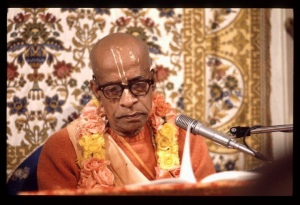SB 1.16.1 (1965)

A.C. Bhaktivedanta Swami Prabhupada
TEXT No. 1
Suta Uvacha: Tatah parikshit dwijavarya siksaya Mahim mahabhagwatah sasahsha ha. Yatha hi sutyam abhijat akovidah Samadishan vipra mahadgun as tatha.
ENGLISH SYNONYMS
Suta Uvcha:—Suta Goswami said, Tatah—thereafter, Parikshit—Maharaj Parikshit, Dwijavarya—the great twice born Brahmins, Sikshaya—by their instructions, Mahim—the earth, Mahabhagawatah—the great devotee, Sasasha—ruled, Ha—in the past, Yatha—as they told it, Hi—Certainly, Sutyam—at the time of his birth, Abhijatakavidah—Expert astrologers at the time of birth, Samadi shan—gave their opinions, Vipra—oh the Brahmins, Mahadgunas—great qualities, Tatha—true to that.
TRANSLATION
Suta Goswami said, oh the learned Brahmins, Maharaj Parikshit then began to rule over the world just as a great devotee of the Lord, under the instructions of the best of the twice born Brahmins and exactly by those great qualities as was foretold by the expert astrologers at the time of his birth.
PURPORT
At the time of Maharaj Parikshit's birth the expert astrologer Brahmins foretold some of his great qualities and Maharaj Parikshit developed all those qualities as a great devotee of the Lord he was. The real qualification is to become a devotee of the Lord and gradually all the good qualities, worth to possess develop in the person of the devotee. Maharaj Parikshit was a Mahabhagwat or the first class devotee who is not only well versed in the science of devotion but also able to convert others to become a devotee by transcendental instructions. Maharaj parikshit was, therefore, a devotee of the first order and as such he used to consult great sages and learned Brahmins who could advice him in terms of the Shastras in the matter of executing the State administration. Such great Kings were more responsible than the modern elected executive head because they obliged the great authorities by following their instructions standard in terms of the instructions left in Vedic literatures. There was no need of enacting daily a new legislature bill by impractical fools and alter it again and again conveniently to serve some purpose. The rules and regulations were already done by great sages like Manu, Yajnvalka, Parasar and other liberated great sages and the enactments were all suitable for all the ages in all the places. Therefore the rules and regulations were standard to the point without any flaw defect or mistake. Kings like Maharaja Parikshit had their council of advisers and all the members of those council were either great sages or Brahmins of the first order. They did not accept any salary nor they had any necessity for such salaries. The state would get the best advice without any expenditure of exchequer. They were themselves Samadarsi equal to everyone both man and animal. They would not advise the king to give protection to a man member of the state and instruct him to kill the poor animals. Such council members were not fools or representatives to compose a fool's paradise; but, they were all self-realised souls and they knew perfectly well how all living beings in the state would be happy both in this life as well as in the next. They were not concerned with the hedonic philosophy of pleasure hunters to eat drink be merry and enjoy. They were philosophers in the real sense and they knew it well what is the mission of human life. Under all these obligations the advisory council of the King would give correct direction and the King or executive head being himself a qualified devotee of the Lord would scrutinizingly follow them for the welfare of the state. The state in the days of Maharaj Yudhisthir or that of Maharaj Parikshit were welfare state in the real sense of the term because nobody was unhappy in that state may he be a man or animal. Maharaj Parikshit was an ideal king of a welfare state of the world.